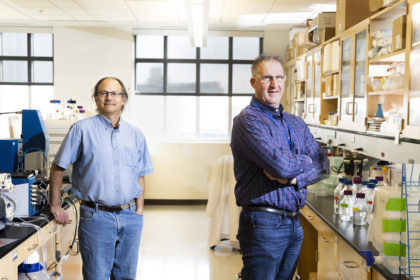
Consumers wanting fermented products must be careful shoppers, cautions Bob Hutkins, Khem Shahani Distinguished Professor of Food Science at the University of Nebraska-Lincoln. [Hutkins, at left in photo, will be speaking at the March 16 TFA webinar on The New Definition of Fermented Food.]
Many products considered fermented (and even labeled fermented) actually contain no live microbes. Sauerkraut stored in a can at room temperature, for example, was heat treated, so the live microbes were killed. He advises to look for products that say “not pasteurized” or “not heat treated.”
So what role do fermented foods play in our gut microbiome? Hutkins says: “The microbes transform proteins into amino acids and sugars into organic acids and they produce vitamins directly in the food. We benefit from that. For example, certain yogurts are more digestible and contain more vitamins than the milk from which they were made. Once we consume those products, the microbes have a chance to reach the gut. Now, we know they do not take up permanent residence, but they could live there for a short period of time and in doing so, they can outcompete pathogens, displace unwanted organisms, and again, produce vitamins and other bioactive molecules directly in the gut.”
Hutkins and Andy Benson, Professor of Food Science at the University of Nebraska-Lincoln, launched Synbiotic Health last year. The company brings their research into the gut microbiome to the marketplace.
Read more (Nebraska Today)
